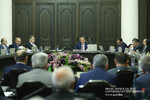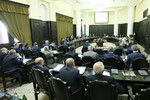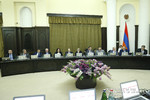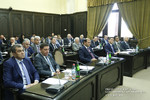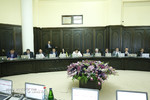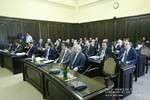Thursday, 19 May 2016
The number of service cars to be reduced by 800 in government agencies
A regular Cabinet meeting was held today, chaired by Prime Minister Hovik Abrahamyan.
Before proceeding to the agenda, Chief of Government Staff David Haroutunyan delivered a report on the assignment issued by the Prime Minister at the preceding Cabinet sitting, which reads as follows:
“Dear Prime Minister,
Dear Colleagues,
In pursuance of the instructions given by the Prime Minister at the previous session, I am reporting that extensive efforts are underway in this direction. We will be proceeding step by step as to the reduction of service cars, 797 cars will be cut down in the first phase.
We have worked with all ministries, except defense and foreign ministries and all agencies other than the police, national security and investigative services, as well as emergency service.
The number of cars financed directly from the budget will be reduced by 107. The number of cars in SNCO, CJSC and different foundations will be reduced by 690. I must say that some of them were used by public agencies.
We suggest that the Minister of Finance should submit a draft government resolution at the next meeting, which would reflect the aforementioned reduction in the number of service cars, as well as the cutback in the maintenance costs for redundant vehicles. In addition, we have prepared a draft Prime Minister’s directive, which states as follows:
1) It is prohibited to attach service (i.e. duty vehicles) to any specific government official. Regular studies by the Prime Minister's Control Service shall be made on the proper use of service vehicles.
2) The official websites of the aforementioned State agencies should contain car-by-car information about the person in charge, the model and the year of manufacture, the engine capacity and the plate number.
3) SNCO, foundation or public institution-owned cars should be banned from being handed over to central executive agencies.
Please be advised that efforts are to be continued in this direction.
In addition, Mr. Prime Minister, we suggest making a strictly targeted and efficient use of budget funds. To this end, public agencies should be instructed to report to the Prime Minister any amendment or re-distribution (including loan and grant programs provided by international organizations and foreign countries, extra-budgetary costs), as well as all procurement nomenclature changes envisaged in the 2016 State budget. This is all for the time being.”
Deputy Prime Minister, Minister of International Economic Integration and Reforms Vache Gabrielyan reminded that the Premier’s last week’s statement contained a recommendation to look into the possibility of optimizing staff in public agencies.
The Deputy Prime Minister reported that pursuant to the Prime Minister’s order, an interdepartmental task force has been set up to conduct a situational analysis and submit recommendations on staff optimization. The working group will hold regular meetings starting next week.
With reference to his vision voiced the other day at the National Assembly session, Hovik Abrahamyan instructed the Minister of Economy to draft a memorandum so that those engaged in business and import activities might be well aware as to what documents are required in order not to create artificial obstacles for other bodies. The Prime Minister suggested posting the memorandum on the Ministry’s official website. The Head of Government stressed the need ensure impartiality in the processing of the results of laboratory tests.
Hovik Abrahamyan urged the State Revenue Committee to create equal tax and customs conditions for all importers and stressed that this process will be closely monitored by the Prime Minister’s Control Service, which will conduct weekly or monthly checks.
The Government amended a previous decision to provide housing and other social services to 8 vulnerable families in need of shelter. The reference note says that there are currently 7 apartments available as social housing at Shiraz Street-27 in Maralik town and 1 apartment in the Masters’ District of Spitak town.
The meeting approved a simplified entry and exit procedure for the construction zone of the new bridge to be built at the Sadakhlo-Bagratashen checkpoint on the Armenian-Georgian State border. The decision seeks to simplify the border crossing procedure for the administrative staff, vehicles, cargoes, goods and others in accordance with the December 24, 2014 agreement signed between the governments of Armenia and Georgia
The meeting next approved the following two agreements: the free trade agreement of May 29, 2015 between the Eurasian Economic Union and its member States, on the one hand, and the Socialist Republic of Vietnam, on the other hand; the “Gyumri city roads” program-related loan agreement of May 11, 2016 between the Republic of Armenia and the European Bank for Reconstruction and Development.
In conclusion, the Government endorsed the proposal on Amendment N8 to the “More competitive and diversified private sector” assistance agreement signed between the Government of the Republic of Armenia and the Government of the United States of America.







